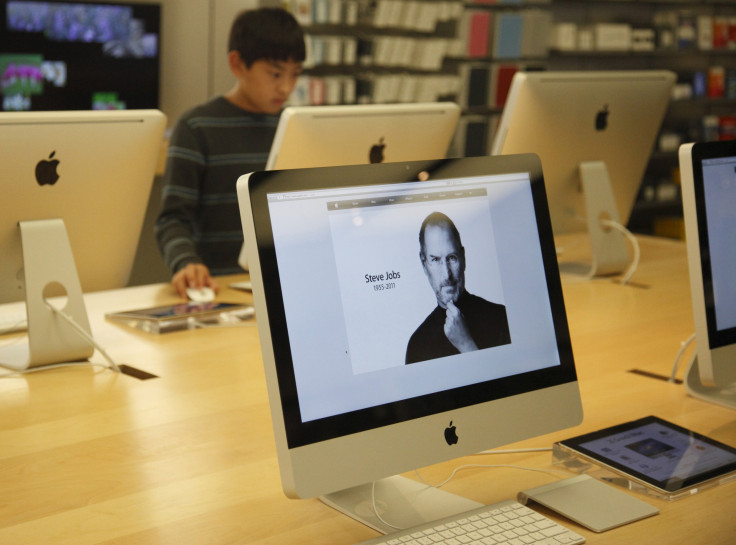Apple’s Slowdown: The Jobs Machine Sees Slower Growth Ahead

Shares of Apple Inc. (NASDAQ:AAPL), the most valuable technology company, fell 12.4 percent in Thursday trading, erasing more than $60 billion of the company’s market value, one of the worst poundings in history. They closed at $450.50, down $63.51, after reporting financial results on Wednesday.
Apple, of Cupertino, Calif., is still valued around $423 billion, or about $7 billion more than Exxon Mobil Corp. (NYSE:XOM), the second-most valuable company.
While Apple’s net income of $13.08 billion, or $13.81 a share, beat analyst estimates, its second-quarter forecast was below estimates. That was the trigger for investors, seeking return on tomorrow’s performance, to sell their shares.
On Sept. 21, they set an all-time high of $705.07, which means they’re now 35 percent below that record high. At UBS, analyst Steve Milunovich said considering Apple’s solid overall performance, “the good news is that Apple could now become oversold.”
What Apple needs, Milunovich said, is “some new products” to show the idea factory created by former CEO Steve Jobs is still alive. Meanwhile, despite a forecast for second-quarter revenue about 20 percent below the prior quarter’s record $54.7 billion, he still rates the shares a “buy,” but with a 12-month price target of $600, down from the prior $650.
During their call with analysts, Apple CEO Timothy Cook and CFO Peter Oppenheimer said there were many new products in the pipeline, although, by custom, they didn’t specify them.
Two analysts, Peter Misek of Jefferies and and Gus Papageorgiu of Scotia Capital, trimmed their ratings on the shares to “neutral” from buys, but other analysts said after the seemingly unstoppable yearlong rise of the shares through last September, the performance since then looks like what they term a “capitulation.”
As well, many noted that cash and investments in Apple’s account, a record $137.1 billion, amounts to $128 a share alone.
With the cash, Apple could buy some of its key suppliers such as ARM Holdings (NASDAQ:ARMH) of the UK, its principal chip partner; or Yahoo Inc. (NASDAQ:YHOO), the No. 3 search engine, and Hon Hai Precision Industry Co. (TPE:2317), its principal contract manufacturer, and still have more than half left over.
Several analysts suggested Apple might announce a “special dividend” like what Microsoft Corp. (NASDAQ:MSFT), the No. 1 software company, declared in 2004. Then it returned $3 a share to its investors because cash was piling up and management didn't know how to spend it.
Oppenheimer said Wednesday that by reinstating a $2.65-a-share quarterly dividend and buying back shares, the company expects to return about $45 billion over three years to shareholders. “We’ll do what we think is in the best interest of our shareholders,” he said.
“Apple may need to start introducing more than one new smartphone a year,” said Todd Haselton, analyst with Techno Buffalo. Although the iPhone 5, introduced on the day Apple shares set their record, is a great hit, it’s essentially built on the same platform as the old iPhone 3S.
“They’re not doing enough to change the landscape,” he said, noting that Apple may have underestimated competition from Samsung Electronics Corp. (KRX:005930), whose Galaxy Note 2 and Galaxy S III are bestsellers, especially in the smartphone sector.
Next week, BlackBerry developer Research in Motion (NASDAQ:RIMM), is finally scheduled to ship BlackBerry 10, which will compete in the enterprise market with iPhones but which could be a major hit in emerging markets like Indonesia and India, where BlackBerries already hold major market shares and are priced far below iPhone 5.
Meanwhile, analysts surveyed by Thomson Reuters expect Apple to report earnings of $11.67 a share on second-quarter revenue of $45.38 billion, compared with the year-earlier’s earnings of $12.30 a share on revenue of $39.19 billion.
For the year ending in September, they see earnings of $47.97 a share compared with $44.19 last year, as revenue gains 21 percent to $189.14 billion.
© Copyright IBTimes 2024. All rights reserved.






















